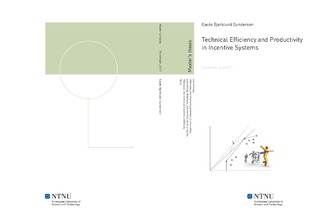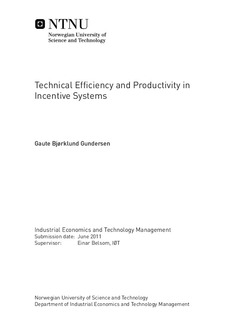| dc.contributor.advisor | Belsom, Einar | nb_NO |
| dc.contributor.author | Gundersen, Gaute Bjørklund | nb_NO |
| dc.date.accessioned | 2014-12-19T14:27:41Z | |
| dc.date.available | 2014-12-19T14:27:41Z | |
| dc.date.created | 2012-01-06 | nb_NO |
| dc.date.issued | 2011 | nb_NO |
| dc.identifier | 473576 | nb_NO |
| dc.identifier | ntnudaim:5949 | nb_NO |
| dc.identifier.uri | http://hdl.handle.net/11250/265925 | |
| dc.description.abstract | In this thesis I evaluate technical efficiency and productivity for use in performance evaluation in incentive systems. In light of agency theory and the organizational context, these techniques have several promising attributes for use in incentive schemes, despite their limited occurrence in the incentive literature. The use of data envelopment analysis (DEA) for estimating technical efficiency limit subjective evaluations and eliminate unwanted Nash-equilibrium under comparative evaluation. The Hicks-Moorsteen index prove to be the preferable index for measuring productivity change, as it cope with technologies exhibiting globally variable returns to scale. By coupling DEA and Hicks-Moorsteen we get four linear programs, which are easy to solve with developed software. However, infeasibility might occur when estimating the index and no remedies to this problem exist in the literature. Infeasibility will not occur for continuous time indices or when estimating technical efficiency with Stochastic Frontier Analysis (SFA). Although, SFA is poor on other aspects and software incorporating continuous time indexes are yet to be developed.The use of productivity as a method for performance evaluation might offset systematic bias for comparative evaluation in heterogeneous environments, and will in most cases give employees strong incentives to improve. Technical efficiency might induce efficient employees to only maintain their level of effort, but super efficiency models reduce this threat. When computing technical efficiency, environmental factors should be adjusted for through a stepwise regression procedure in order to reduce uncontrollable risk. Although the goal is to implement a model that minimize subjective evaluations that might lead to favoritism, a final expert judgment should verify or disprove the performance scores. | nb_NO |
| dc.language | eng | nb_NO |
| dc.publisher | Institutt for industriell økonomi og teknologiledelse | nb_NO |
| dc.subject | ntnudaim:5949 | no_NO |
| dc.subject | MTIØT Industriell økonomi og teknologiledelse | no_NO |
| dc.subject | | no_NO |
| dc.title | Technical Efficiency and Productivity in Incentive Systems | nb_NO |
| dc.type | Master thesis | nb_NO |
| dc.source.pagenumber | 105 | nb_NO |
| dc.contributor.department | Norges teknisk-naturvitenskapelige universitet, Fakultet for samfunnsvitenskap og teknologiledelse, Institutt for industriell økonomi og teknologiledelse | nb_NO |

